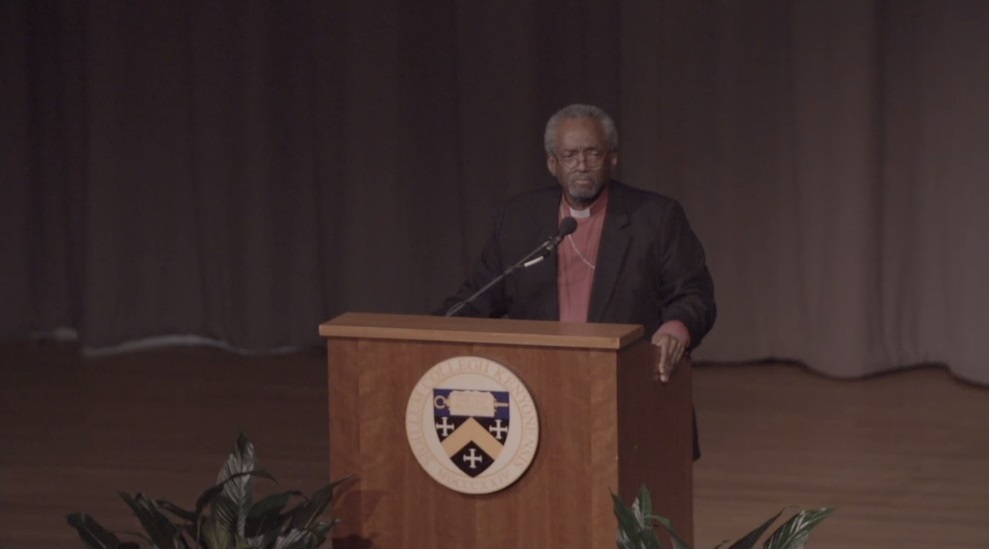Episcopal bishops offered words of encouragement in the face of frustration over the progress of civil rights, social justice, and civility in the United States over the Martin Luther King, Jr., holiday weekend.
In West Haven, CT, according to the New Haven Register, the Rt Revd Nathan D. Baxter, retired bishop of Central Pennsylvania, offered this analysis of the current climate.
We are living in a contemporary moment where it seems that all the progress that we have made” is facing “it seems like, from the highest offices … a consistent pattern of derogatory diminishment,” the Right Rev. Nathan D. Baxter, retired bishop of Central Pennsylvania, said at a tribute to the late Rev. Dr. Martin Luther King Jr.
The tribute service, of which Baxter was celebrant, was sponsored and organized by the Union of Black Episcopalians’ Southern Connecticut Chapter.
“We find ourselves in a time when we can’t think of the hard issues because we’re so distracted by the abusive issues,” Baxter said.
But “history is on our side” and “the God who created the universes and who has shaped the rainbow of the moral ark of justice is on our side,” he said.
In an opinion piece at the Huffington Post, the Rt Revd Jake Owensby of Louisiana sounded similar notes of outrage at the apparent stalling of progress. He did not make reference to the Martin Luther King holiday, but noted that the work of justice is a long haul.
Many of us were outraged last week. By something the President said. Again. This time, his words came in the context of negotiations about immigration policy. He referred to nations with predominantly black populations as “sh#%hole countries.”
Some have speculated that his relentless barrage of outlandish tweets and racist dog whistles aims strategically at overwhelming our capacity for moral indignation. And in truth some have perhaps grown weary and even resigned themselves to a ghastly new normal in our country.
They are numbed and demoralized by the sense that the clock is irresistibly rolling back on racial and gender equality. And in truth, even the stoutest among us can be propelled by intense outrage only so many times before collapsing in a moral stupor.
As for me, I’m gearing up for a long run. That’s not to say that I don’t feel outrage, but I’ve begun to believe that responding heatedly to every objectionable, outlandish word from our elected officials will be like trying to run a marathon as if it were the 100 meter dash. I’m reaching deep for a sustained resolve, a hunger for justice that drives me forward even when I’m weary.
While Owensby is “gearing up for a long run,” Baxter drew inspiration from the progress that has been made, despite current appearances.
He spoke about the progress that has been made over the years for both African Americans and women, among other groups.
Years ago, “If you were a woman, who would have imagined that we would have women in leadership locally and nationally?” he asked.
But “how did we get over? How did we get to this place?” Baxter preached, reciting a litany of other social and ethnic groups that also had to fight for equality. …
The answer in many cases was that “we not only see political action, but we see people drawing on their faith — Christian, Hebrew, Buddhist — whatever it may be,” Baxter said. “They brought that power.”
At Kenyon College, Ohio on Monday, the Most Revd Michael Curry, Presiding Bishop, drew on those themes of faith as he led a dialogue on “Becoming Beloved Community.” He took as his text the words of Dr King,
“We shall either learn to live together as brothers and sisters, or perish together as fools. The choice is ours: chaos, or community.”
Curry added,
On one level, [these words] are a cry of utter despair … and at the same time, simultaneously, they are words of a profound and desperate hope. Prophetic speech is often like that. It is both a cry of despair, facing the nightmare, and it is a plea of hope, daring to envision a future, and to dream.
Curry’s invitation was to choose to become a beloved community.” “We can do it,” he said.
You can view Curry’s address at Kenyon College and the panel discussion that followed here.

